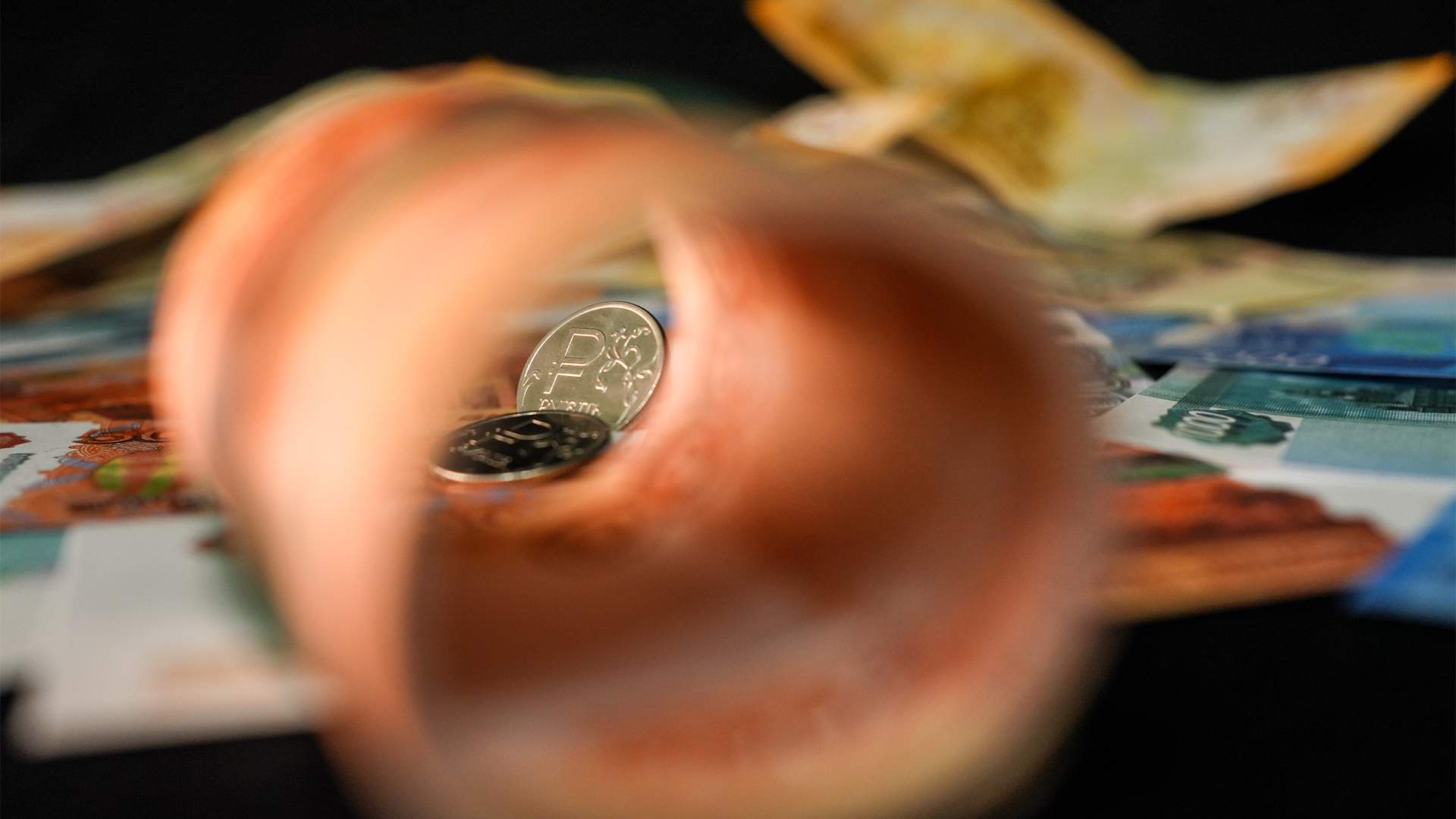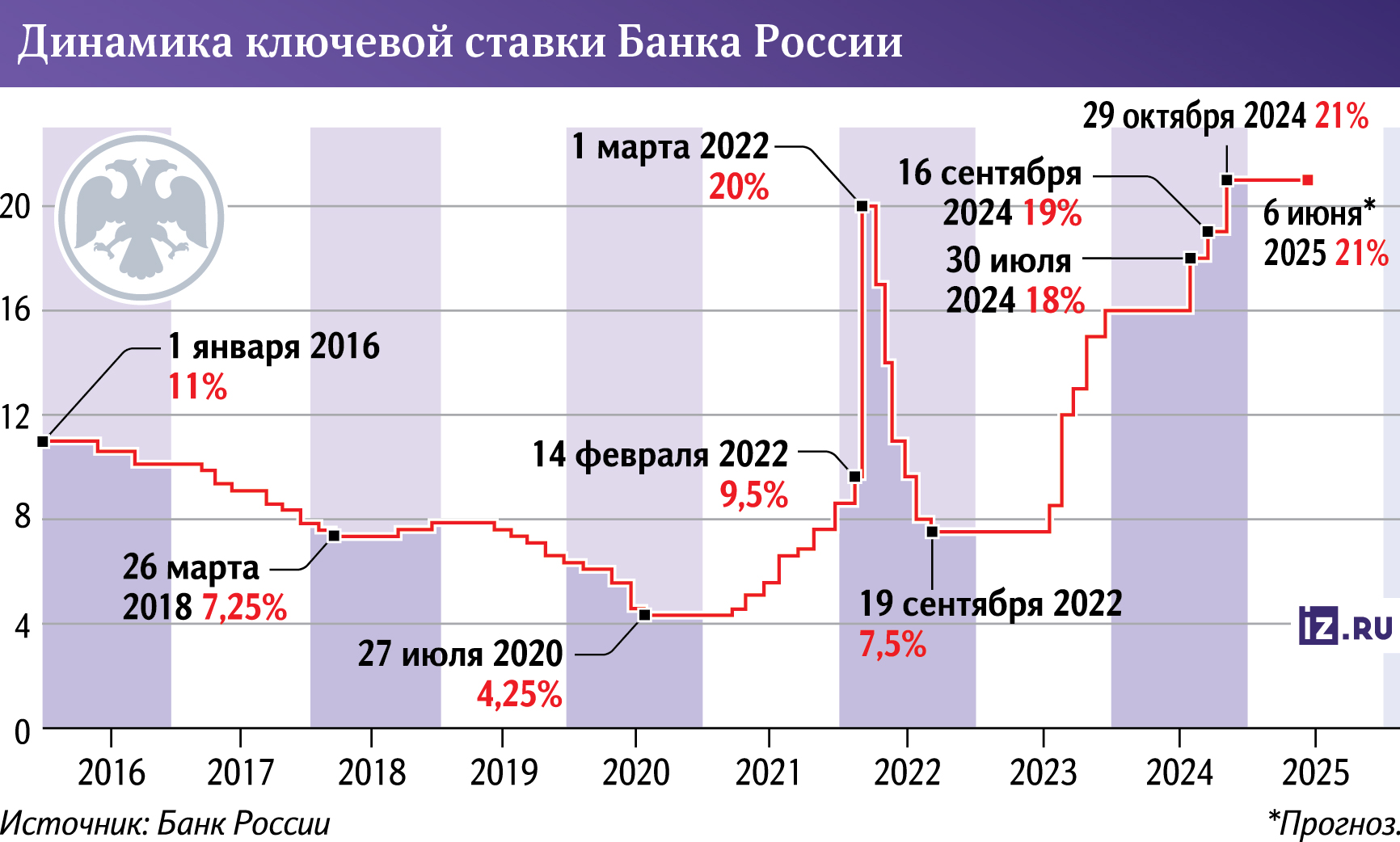To accept from the rate: the market expects the key rate to remain at 21% in June

The key rate will remain at 21% following the results of the meeting on June 6, follows from the consensus forecast of Izvestia. The experts surveyed agreed that this time the Central Bank would soften the signal, and decisions would be made at future meetings. Nevertheless, there are optimists who admit the possibility of reducing the rate by 1-2 percentage points next week, because inflation and GDP are slowing faster than expected. But this is not the main scenario. It is important for the authorities not to overcool the economy and provide timely support to it, otherwise the fight against rising prices may go too far. What will affect the Central Bank's June decision is in the Izvestia article.
How the Central Bank will change the key rate in June
The Bank of Russia will keep the key rate at a record level of 21% following a meeting of the Board of Directors on June 6. This is the opinion of 28 out of 32 market participants and analysts surveyed by Izvestia. However, four more gave a more positive outlook. Three expect the rate to be reduced by 1 percentage point, and one more — by 2 percentage points at once.
At the same time, most experts are convinced that in June the Central Bank will definitely soften the signal to the market and indicate the possibility of future monetary policy easing as early as July, said Alexey Lossan, an expert at Compare.
At the last meeting on April 25, the Central Bank kept the key rate at 21% and has already switched to a completely neutral signal, Olga Belenkaya, head of the Macroeconomic analysis department at Finam, reminded. Now the most correct decision would be to keep the rate at the same level and further soften the rhetoric, economist Alexey Krichevsky added.
He noted that it is not typical for the Russian regulator to make "sudden movements" without good reason.
In general, the situation in our economy is developing according to the base scenario of the Central Bank, said Mikhail Vasiliev, chief analyst at Sovcombank. According to him, inflation is decreasing, but it takes time to make sure the trend is stable. In addition, it still remains quite impressive — about 10%.
The economic situation is already conducive to easing monetary policy, but the Central Bank will maintain a conservative position, said Viktor Grigoriev, chief analyst at Bank Saint Petersburg. According to him, there are still risks to inflation, and premature soft signals may overly reassure the market.
For example, if banks start cutting rates too quickly, the savings rate will fall and more Russians will spend on consumption. This is a factor in favor of accelerating demand for goods and services in the Russian Federation, which clearly does not contribute to the fight against inflation. After all, the purpose of the key rate is to enable the economy to "catch up" with too high demand until the country's production capacities recover.
"Under the conservative scenario, the first rate cut will take place at the September 12 meeting (to 20%), and under the optimistic forecast, it will be on July 25," said Sergey Grishunin, director of the NRA rating service.
How a high key rate harms the economy
The Central Bank meeting on June 6 will be held again in conditions of increased uncertainty, Olga Belenkaya from Finam emphasized. On the one hand, maintaining the key amid a slowdown in price growth creates a risk of "hypothermia" of the economy. GDP slowed down faster than the regulator's forecasts — this may require more active rate easing, agrees bitkogan project analyst Ivan Verbny.
— Nevertheless, 21% is an abnormally high level of interest rates, and in any case, it makes sense to start gradually reducing it, — Olga Belenkaya clarified.
Inflation needs to be cooled only to a certain level, recalled Hovhannes Ohanisyan, director of the analytical department of Cifra Broker. According to him, there are signs of a slowdown in the economy, therefore, to support it, the Central Bank may actively reduce the rate at the next meeting.
Why does the Central Bank keep the rate
However, on the other side of the scale is an increase in inflation expectations, which may also cause prices to accelerate, Olga Belenkaya said. That is, Russians are less and less positive about the future price situation. This is happening because the cost of individual goods continues to rise, primarily food products. The situation was affected by the spring frosts, due to which the harvest situation has not been determined this year.
The labor market situation also remains difficult — the unemployment rate is still at historic lows, added Viktor Grigoriev from Bank Saint Petersburg. There are no "free hands" — this does not give the economy the opportunity to increase production capacity, which leads to a shortage of goods and services on the market, which pushes prices up.
In addition, the Central Bank may fear that with a rapid rate cut, financial institutions and businesses will "get ahead of themselves" in their expectations for future decisions, Olga Belenkaya said. In this case, the regulator risks losing control over the pace of monetary easing.
The geopolitical factor and the state of the global economy also make it difficult to properly refine the forecast, concluded Mikhail Vasiliev from Sovcombank. The situation in the global economy is contributing to a weaker ruble, but the prospects for resolving the Ukrainian conflict have allowed the national currency to gain a foothold at below 80 per dollar. All this should lead to the fact that the prices of imported goods should stop rising or even slightly decrease.
Most importantly, in April, Rosstat recorded a slowdown in annual inflation for the first time since the beginning of the year, and monthly price growth has been slowing for six months in a row, Natalia Milchakova, a leading analyst at Freedom Finance Global, recalled. It cannot be ruled out that, taking into account these factors, the Central Bank will make a more radical decision and abandon its conservative position, although the probability of such an outcome is still low.

Переведено сервисом «Яндекс Переводчик»






